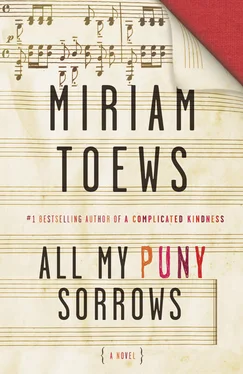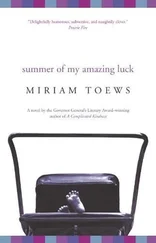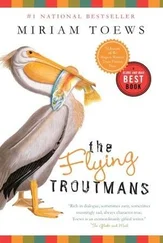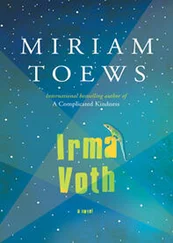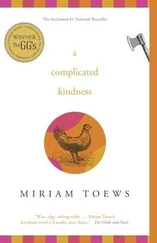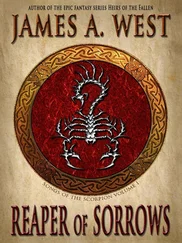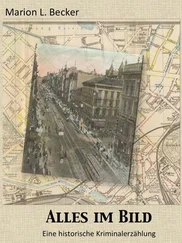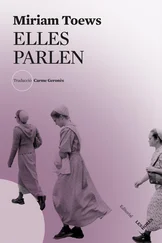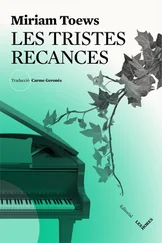Oh! said my mom. Well!
I’ll be at home all the time and Nora will be there a lot. It’ll be a different scene for her. No pressure. It’s worth a try, right? I could rent a piano for her if she wants to play and we could even get a boat or something.
A boat? said my mom.
Because I live by the lake. We could get a small rowboat and go out on the lake if we wanted to.
We were quiet for a while thinking and listening to two teenage girls in the row behind us having a conversation about school and their volleyball team and boys and rashes and then we heard another voice, an older woman who sounded drunk, saying: listen, I will give you two kids one hundred dollars … each … if you can finish this flight without ever saying the word like again. The girls stopped talking and the woman said deal? The girls said, like, each of us? And all of us within earshot of this smiled at each other. Then a man in the aisle began to complain that somebody’s kid had bit him in the ass when he’d stood up to get something from the overhead bin. It was true, I’d seen it, a three-year-old was marching up and down the aisles, bored out of her mind, and suddenly came face to ass with the guy and just opened her mouth wide, chomp, and the guy screamed, he hadn’t known what had hit/bit him and the little girl stood there with her arms folded across her chest while her mother apologized profusely in a posh British accent, ordering the kid to say she was sorry. I won’t, insisted the little girl, also with a lovely accent, and the mother said you will and the girl said I won’t, you will, I won’t. Finally the guy whom she’d bitten said it really wasn’t a big deal, just a big surprise that’s all, and let’s be done with it. But the mother was relentless, kept insisting that her kid apologize, you will, you absolutely will, until a whole bunch of people from seats 14A to 26C all yelled out she won’t!
That sounds wonderful, Yoli, my mom was saying. What does Elf think about it?
She wants to do it, I said. I’m going to get Nora’s room ready for her. Nora’s totally fine sleeping on the futon in the living room. I’ll be at home anyway trying to finish this book. We’ll walk and eat and sleep. We’ll do whatever Elf wants to do. It’s worth a try, right?
I like the idea of the boat, said my mother. And Nicolas? You’ve talked to him about it?
Not yet but I’m sure he’ll be okay with it, I said. I mean he’ll miss her, obviously, but it won’t be forever.
But are you sure you’re up to it? said my mom. We don’t know what Elfie will do. Ever.
I know, I said, but what difference does that make? Either way, if she’s here or in Toronto with me, we’ll worry anyway. So maybe a change will be the best thing? The tour is off now so she doesn’t have to think about it. Or anything.
Well. My mom sounded unsure. It could be a good thing, couldn’t it?
After the funeral we all sat around in the big dining room of the church, eating ham and cheese sandwiches and reminiscing about Tina. Uncle Frank sat hunched over, his face very close to whoever was talking, intense, nodding, not wanting to miss a word. If he could absorb every single sentence uttered about his beloved mercurial wife, store every word and syllable somewhere deep within his body, then maybe he could keep her for a little longer. I loved the way he listened as though his life depended on it.
The funeral had been held in a Mennonite church so the usual squad of perpetual disapprovers (they don’t take breaks, not even for funerals) stood huddled in one corner, occasionally firing glances at the rest of us but we were used to their negative juju and tried never to let their gaze meet ours. As we entered the sanctuary before the funeral service my mother sighed and breathed oh Lord to the backs of a hundred black-suited men who were already seated on their side and I knew what she meant. Don’t engage, I whispered in her ear, and she squeezed my hand as we walked to the front of the women’s side with our family. Violence is eternal. It changes shape and gets in like water. What’s a pacifist supposed to do with eternal violence if it can’t be volleyed back directly at the enemy? We sang hymns in four-part harmony. Uncle Frank was in the front pew on the men’s side and while we were singing “What a Friend We Have in Jesus” he swung around and gave my mother and me two thumbs up, which we returned.
After the funeral, in the dining room, I overheard snippets of a conversation my mother was having with my cousin Hans: she came to Winnipeg to help me and then she died! Earlier, before the funeral, some of my cousins and I went to Leni’s grave. It said Safe In The Arms Of Jesus on her tombstone. My aunt’s ashes would be buried just a bit down the hill and slightly to the north of Leni. The cemetery is small and green and old and reminds me of the cemetery in East Village where my grandparents, Helena and Cornelius, are buried, and behind them, in a neat row, the little graves of six of their babies. Of the sixteen kids that Helena gave birth to only ten made it to adulthood. I wondered how that worked, Helena’s grief. If, at the end of the day, after all her chores were done and the evening was softening things a bit and she had a minute or two to cry or think, I wondered if she knew exactly who or what she was crying or thinking about, and if it even mattered. I wondered if my grandmother had ever said to my grandfather, honey, no, not tonight, we already have fourteen or maybe fifteen, I’ve lost track, and of those fourteen or fifteen, sweetheart, I have buried six and I’m more tired than all the world. And now her Tina’s gone as well and her Lottie is the last one standing, and fighting off armies of her own. So it goes.
After the funeral, people took turns going up onto the little stage and telling stories and recounting memories of Tina, a Mennonite tradition called freiwilligis . I saw relatives I hadn’t seen in years. Sheila was the convivial emcee of the event. Her husband Gordon had to say a few words off the cuff to kill time while Sheila tried to stop herself from crying long enough to do her thing at the microphone. Gordon thanked us all for coming and said what a shame that Tina, being the party animal she was, couldn’t be here to take part. Then Sheila rolled her eyes, somewhat more composed now, and took the microphone from Gordon. She said well, folks, in all her life my mother’s heart has never failed her … until now. She said a few more things and then opened up the mic for others. There was a table beside her covered with photographs of Tina in the various stages of her life. My favourite one was of her hanging out the window of her dad’s Oldsmobile when she was seventeen and waving goodbye, a giant grin on her face. See ya later, pioneers! I’m going to the city!
On the floor next to the microphone was a beautiful wooden urn, like a small wishing well, that held Tina’s ashes. One of my fifty-six cousins’ wives was up there talking about the way Tina sped around town in her van with the flame on the side and knew how to evade cops at every turn and while this woman was talking her little toddler son crawled up onto the stage and over to the wooden urn. He sat next to it and banged on it for a while and then, while his mother, oblivious, kept talking about Tina and all her charming qualities, her boldness, her tenderness, her zest for life, the little kid somehow managed to take the lid off the urn. We all watched, open-mouthed, as he started to sift through the ashes of Tina and then fling them around up there, having a heyday playing with his great-grandma’s remains, and his little white-shirt-and-shorts outfit grew black from the dust and so did his face. And then he started putting the ashes into his mouth with his little dusty hands and by this time everyone had noticed, and his father was up on the stage picking him up, a lot of people were laughing now (except for the perpetual disapprovers who looked on in stern horror) and his mom stopped talking at the microphone and turned around and she saw that the boy’s father now had everything under control and he brushed the ashes off the boy’s clothes and wiped his face and put the lid back on Tina’s urn and brought the child back to the table and the mother, my cousin’s wife, turned calmly back to the microphone and finished her story about Tina and her van and I learned another thing, which is that just because someone is eating the ashes of your protagonist doesn’t mean you stop telling the story.
Читать дальше
